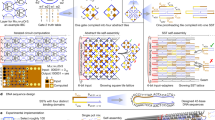Abstract
In the decade since the first molecular computation was performed, it has been shown that DNA molecules can perform sophisticated, massively parallel computations avoiding the Von Neumann bottleneck. However, progress in the field has been slow. The largest problem solved to date is an instance of the 20-variable 3-CNF SAT problem. Performing the computation took more than two man-weeks to complete because every aspect of the computation was performed by hand. Molecular computations are extremely labor intensive and error prone–automation is necessary for further progress.
The next step, (the second generation DNA computer – that of taking the laborious, laboratory bench protocols performed by hand, and automating them), has been achieved with the construction of an automated DNA computer dubbed EDNAC. It employs the same paradigm that was used to solve the labor-intensive instance of the 20-variable 3-CNF SAT problem. Using a combinatorial DNA library and complementary probes, EDNAC solves instances of the n-variable 3-CNF SAT problem. A 10 variable instance of the 3-CNF SAT problem was essayed. The computation took 28 hours to perform. EDNAC correctly computed nine of the ten variables, with a tenth variable remaining ambiguous. This result is comparable to current results in the molecular computation community. This research tested the critical properties, such as complexity, robustness, reliability, and repeatability necessary for the successful automation of a molecular computer.
Preview
Unable to display preview. Download preview PDF.
Similar content being viewed by others
References
Adleman, L.: Molecular computation of solutions to combinatorial problems. Science 266, 1021–1024 (1994)
Braich, R., Chelyapov, N., Johnson, C., Rothemund, P., Adleman, L.: Solution of a 20-Variable 3-SAT Problem on a DNA Computer. Science 296, 499–502 (2002)
Braich, R., Johnson, C., Rothemund, P.W.K., Hwang, D., Chelyapov, N., Adleman, L.: Satisfiability Problem on a Gel Based DNA Computer. In: DNA Computing – DNA 6, vol. 2054, Springer, New York (2000)
Reif, J.H.: Computing. Success and challenges. Science 268, 478–479 (2002)
Lipton, R.J.: DNA solution of hard computational problems. Science 268, 542–545 (1995)
Olsen, K., Ross, D., Tarlov, M.: Immobilization of DNA Hydrogel Plugs in Microfluidic Channels. Anal. Chem. 74, 1436–1441 (2002)
Author information
Authors and Affiliations
Editor information
Editors and Affiliations
Rights and permissions
Copyright information
© 2006 Springer-Verlag Berlin Heidelberg
About this paper
Cite this paper
Johnson, C.R. (2006). Automating the DNA Computer: Solving n-Variable 3-SAT Problems. In: Mao, C., Yokomori, T. (eds) DNA Computing. DNA 2006. Lecture Notes in Computer Science, vol 4287. Springer, Berlin, Heidelberg. https://doi.org/10.1007/11925903_28
Download citation
DOI: https://doi.org/10.1007/11925903_28
Publisher Name: Springer, Berlin, Heidelberg
Print ISBN: 978-3-540-49024-1
Online ISBN: 978-3-540-68423-7
eBook Packages: Computer ScienceComputer Science (R0)




